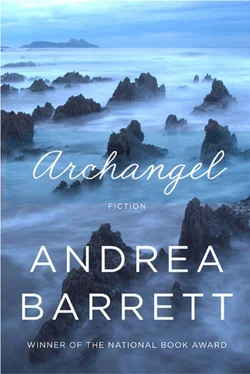“Better hurry,” Daphne advised, sliding something from the blade of her knife. “We only have another minute or two.”
Quickly Henrietta gathered a starfish, her own sea urchin, two sea anemones with waving white fronds and another mostly orange, three small crabs, a couple of mussels, algae red and green and pink, and a bit of Fucus encrusted with a kind of hydrozoan.
“Time!” the professor called from above. The previous day he’d drawn a map of the western hemisphere on the board and then divided it into five zoological regions. Each was inhabited, he explained, by animals perfectly suited to that province, confined to those geographical limits. In each the animals were endowed with instincts and faculties perfectly corresponding to the region’s physical character. But because the climate of a country was allied to the peculiar character of its fauna, that didn’t mean that the one was the consequence of the other; were that the case, all animals living in similar climates would be identical. Rather, the perfect distribution signified the work of a Supreme Intelligence who created, separately and successively, each species at the place, and for the place, which it inhabits. The animals were autochthonoi : originating, like plants, on the soil where they were found.
Henrietta’s wet skirts dragged as she lowered her head and began to move back into the sunlight. Did that mean, then, that the creatures in the grotto had each been created to fill its own tiny niche? That they were — did one use the adjective? — autochthonous ? Wondering about this, trying to remember what, exactly, the professor had said, which had seemed far clearer yesterday, she set her knee down squarely on a patch of barnacles. As she jerked her leg she somehow kicked Daphne, who in an effort to steady herself overturned her bucket, letting out a cry louder than Henrietta’s.
The professor leaned over the ledge, nearly falling from his stool as he called, “Are you all right?”
Daphne, grasping futilely at her escaping prey, said something under her breath.
“Barnacles,” Henrietta gasped. The sharp plates had razored through her skirt, but she was more concerned at the misery on Daphne’s face. “I’m sorry,” she said. “That was so clumsy — you’ll share what’s in my bucket?”
Daphne pressed her lips together. “What choice do I have, now?”
“Take some samples of your assailant!” the professor called genially. “The Cirripedia are fascinating, even if their armor is painfully sharp. God has so ordained that these creatures, who in their second larval stage resemble little shrimps, should swim about until they find a home and then cement themselves headfirst in place, transforming themselves into stony lumps that gather food by waving their feathery little legs. As miraculous, if you think about it, as if a creature born in the form of a perch should shed its skin to turn into an eel and then into a robin, only to glue its forehead to a rock and transform itself into a horse waving its hooves in the air.” He pointed at the blood staining Henrietta’s skirt. “You have been kicked, though. Do take care of that knee.”
Daphne, loaning her a handkerchief and then spreading her own skirt wide to block Henrietta’s legs from view, said crossly, “If he wasn’t going to give us a chance to replace our lost specimens, he might at least have found a more original comparison.”
“What are you talking about?” said Henrietta, dabbing at her wounds.
“Comparing the stages of barnacles to a fish that turns into a horse — someone else said that, I read that in an old book about microscopy.” Pointing at Henrietta’s knee, she added, “You missed a spot.” And then, as Henrietta dabbed again, “Swish the handkerchief around in the water when you’re done. Then the stain won’t set.”
Smart as well as practical, Henrietta noted. Not to mention sharp-tongued. Back at the laboratory, where the professor directed them to their workstations, she was pleased to learn that, for the next six weeks, she and Daphne would share not only the contents of a collecting bucket but an aquarium, a table, and a window.
“Lucky me,” Daphne said.
Her lips twisted so briefly that Henrietta couldn’t be sure she saw the movement. Impulsively, she pushed the bucket across the table. “These are yours now, not mine. Could we start again? I’m not usually so clumsy.”
Daphne looked at the bucket, at Henrietta’s hand on the bucket, finally at Henrietta’s face — and then she smiled, so openly that Henrietta felt a huge rush of relief. Together they decanted their specimens into glass bowls and jars and worked through the afternoon, exchanging quiet comments as the professor talked and strolled between the tables. One mussel they’d collected had a broken shell; they fed it to a hungry sea anemone and watched the tentacles draw it inside. After dinner, they listened to one of the assistant teachers talk about the remarkable ability of the holothurians, or sea cucumbers, to escape their predators by ejecting their viscera and later regrowing them.

THE YACHT CONTRIBUTED by one of the professor’s friends from Boston arrived the following week; a colleague at the Coast Survey donated a dredging outfit; by the second weekend the students, grouped into boatloads of eight or ten, had all made at least one excursion, learned to use the implements, and collected some deep-water specimens. On the second Sunday, François spilled from the dredge an excellent example of a basket-fish, which obligingly gathered its five sets of finely branched arms around itself until it looked exactly like woven wicker. Later, as the deck dried and it began to want water, it relaxed into a lacy disk, arms extended around its pentagonal body.
“Oh!” one observant student exclaimed. “It’s a kind of starfish!” As indeed it was, the professor explained, back in the laboratory. A brittle star, of the genus Astrophyton . He kept to himself the species name, because it was named after him.
Happily exhausted, their hands nicked and scored, the students collapsed on the beach that evening and enjoyed the corn roasted over the fire and the plates of clams steamed in a pit filled with hot rocks and seaweed. Two of the teachers, François and Alpheus, had pitched in to help the kitchen staff organize the feast; another, Arnold, had led a toast; he’d made a little speech himself. Now the work was done, the sky had darkened, the plates were crated and back in the kitchen. The students were talking and laughing quietly, idly drawing shapes in the sand, using the tan husks of tiny horseshoe crabs as finger puppets. Someone’s laugh broke into a curious wheeze at the end of each note. Someone knocked over the jar of fireflies someone else had captured. Those who’d already had some experience teaching in high schools and colleges would be sharing what they knew, the professor imagined, with those about to start their first teaching jobs. Alliances would be blossoming, along with at least one rivalry and perhaps a romance or two. Classes all passed through similar stages, which he pretended not to notice although sometimes, as had happened this evening, he caught himself eavesdropping. She said, he said, I wish I knew, when I go home … All trying so hard to make themselves known to each other. All eager to learn from him and from his dear former students, who loyally continued to follow his teachings despite, as he well knew, secretly leaning in other directions.
François, who’d patiently rigged the dredging equipment and pulled up the prize Astrophyton , was considering where he should take the next expedition. Charles — when had he gotten so bald? — wanted permission to extend the trench he’d opened in the rise above the salt marsh, which he was using to illustrate soil formation and botanical succession. Arnold wanted to show the rest of them a book a friend had sent him: The Forms of Water in Clouds & Rivers, Ice & Glaciers . Perhaps it might be useful in a class. Odd, though, to find within it their own exploits from the early 1840s.
Читать дальше













